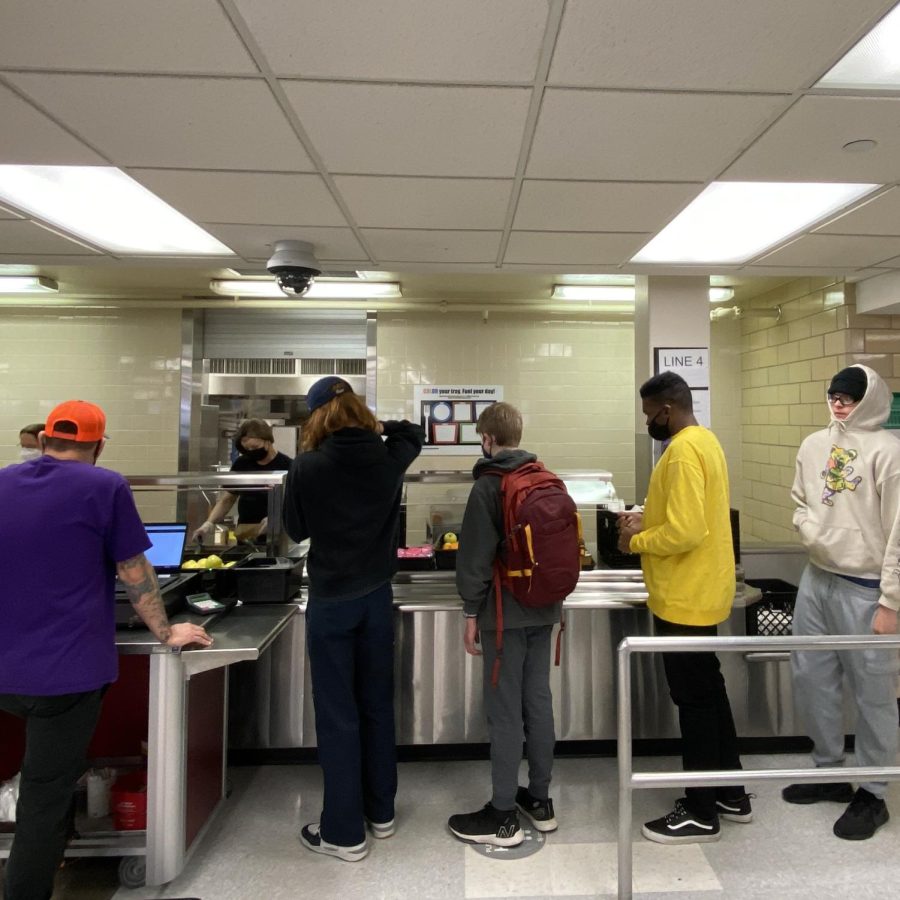A salad a day keeps the accommodations away
Lunch room’s attempt at dietary accommodations falls flat
Students in the cafeteria line up for lunch during second lunch April 15. Students with dietary restrictions have had a lack of choices for lunches.
May 2, 2022
It’s not uncommon to be late to a class, miss your bus, or forget your lunch, but students at Park with dietary restrictions can’t afford to forget their lunches. For far too long, my peers who need food accommodations have had to “just eat salad” or “remember to have quarters so they can at least eat a bag of chips.” Parks lack of options for students with dietary restrictions leaves them with little to no options.
Some students are fortunate enough to be able to afford to bring lunch from home, but others don’t have the same luxury. Park recognizes these challenges and provides free school meals, but low-income students that need food accommodations don’t have the same options that most students do. Their main options consist of a salad, PB&J or occasionally pizza. If you’re vegan, you can rule out pizza. If you’re gluten free you can get a salad, but only on the days where they don’t have bread. This means many students at Park have just accepted the reality that they will, and always will, have to figure out their own ways to get food. Should low income students have to risk food intolerances or sacrifice religious morals just to eat lunch at school?
Even if they do find one of the few options for them appealing, students with dietary restrictions at Park have to worry about cross contamination. For the past few years, Park students have heard empty promises of kitchen renovations to include halal and kosher kitchens. But complications with the pandemic and budget-cuts have put an indefinite end to any substance that was in these promises. Since all the food is prepared in one kitchen, it’s hard to know if your food is actually gluten-free or meeting any religious standards because there’s no way to control cross contamination. It’s a very real and scary possibility that allergens can get into your “safe” food during the cooking or serving process — that can have very serious health consequences for many.
Though Park tries to accommodate dietary concerns, their efforts fall short. No one wants to eat the same salad with questionable dressing everyday, but so many of my peers are forced to do so. Park needs to integrate more options for all dietary restrictions, whether it be for religious purposes or allergies. It simply isn’t acceptable to offer growing students PB&Js or small boxed salads everyday and expect them to make-do. Park also needs to step up their safety game, and ensure their students don’t need to put their morals or health at risk to be able to eat at school. We need stronger, more clear-cut plans on how Park plans to reduce cross-contamination — and we need full transparency on how safe the food at Park is. It’s absurd how limited information on allergy accommodation and nutrition is at Park, and how difficult it is to do basic research on how Park deals with allergens and contamination. Regardless of allergies, economic status or religion, all students at Park should have access to nutritious, filling, and simply put — good food.




